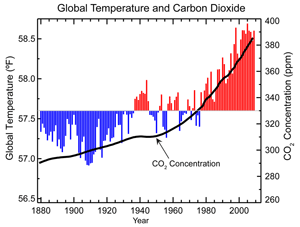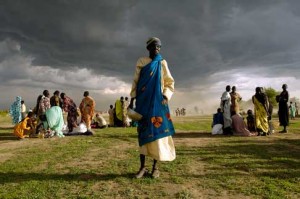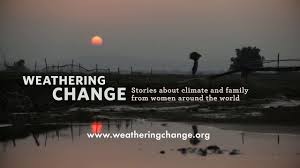Is Anyone Listening? Climate Change and the Need to Empower Women
Mar 31st, 2014 | By admin | Category: Climate ChangeBy Suzanne York, www.howmany.org
In yet another dire warning, the United Nations Intergovernmental Panel on Climate Change (IPCC), comprising hundreds of scientists and government representatives from across the globe, released its long-awaited report on the impacts of climate change.
The IPCC report states that climate change has already “caused impacts on natural and human systems on all continents and across the oceans.” If nothing is done to curb global carbon emissions, there will be greater droughts and floods, food and water shortages, and extinctions of animals and plants. It’s not exactly breaking news, but certainly another call/plea for action.
However, despite the IPCC report and the fact that the effects of climate change are increasing around the world, business as usual continues unabated. And though governments have pledged to limit the global temperature increase to two degrees Celsius, the planet is heading towards a four degree world.
As the report is hyped up in the news and provides fodder for debates between conservatives and progressives, one thing that is likely to be overlooked is the impact of climate change on women, and what can be done to help women cope with it.
Climate Change and Women’s Rights
Women are disproportionately affected by a changing climate. This was raised at another recent UN gathering, the Commission on the Status of Women(CSW). In mid-March, policymakers, experts and advocates for women’s rights discussed the need for greater global investment in reproductive health, education, and gender equality – all critical components of the climate change issue – but barely recognized in global climate discussions.One side event during the CSW focused on women and climate change. The “Sustainable Solutions to Ending Climate Chaos” panel included some on-the-ground solutions that women are undertaking to cope with weather variations.
Gertrude Kenyangi of Support for Women in Agriculture and Environment in Uganda, works with women farmers at the grassroots level. She said that “Africa is being assaulted by climate change” and “poses a huge threat to the livelihoods of millions.” Kenyangi has worked with communities which have experienced 100 percent crop failure. Across the continent, almost 98 percent of the agriculture is rain-fed and dependent on natural conditions.
One solution is agro-ecology, a holistic approach that builds upon the traditional knowledge of family-based farmers and encompasses basic ecological principles for planning and managing sustainable agricultural systems. It is an answer, Kenyangi said, “to scarcity of agricultural land as it conserves biodiversity and enhances soil fertility, resulting in healthy ecosystems and high productivity.”
Ugandan women have adopted agro-ecology in response to crop failure, food shortages, and conflicts over the few remaining natural resources. Rainwater harvesting, planting the right trees to combat soil erosion, and even using cow urine as a natural pesticide are just a few examples of how agro-ecology is helping communities adapt in the face of climate variability.
Supporting Choice in the Face of Climate Change
Part of empowering women is respecting their reproductive rights and providing access to voluntary family planning. This is “low-hanging fruit” – helping women make choices that are good for themselves and their families. Supporting reproductive health helps build resilience to climate change impacts.
This applies to women in all countries, but especially in developing nations, where there are 222 million women who want access to contraception but do not have it. According to the Guttmacher Institute, contraceptive care would cost $4.0 billion in the developing world. To fully meet the existing need for modern contraceptive methods of all women in the developing world would cost $8.1 billion per year.
Creating a Rights-based Future
The IPCC report concludes that responding to climate change involves making choices about risks in a changing world. That should include empowering women to make the best choices in all aspects of their lives, which will help not only people, families, and communities, but the global environment as well.
In a world of over 7 billion people and growing, ensuring women’s rights (and all human rights) can be one of the most valuable tools in the face of climate extremes.
Suzanne York is a senior writer with the Institute for Population Studies.



